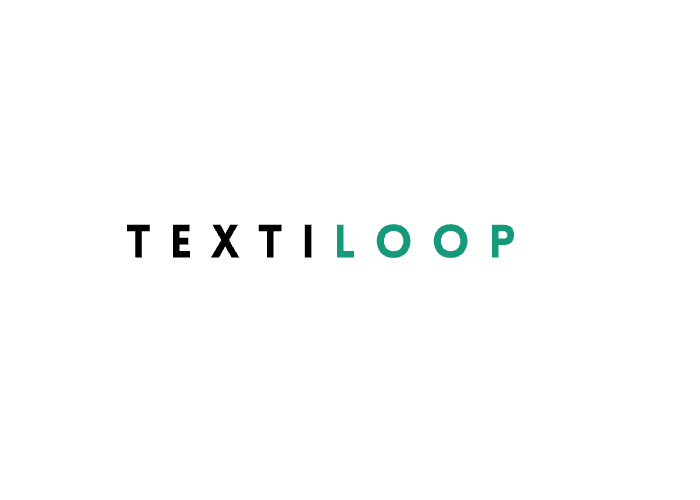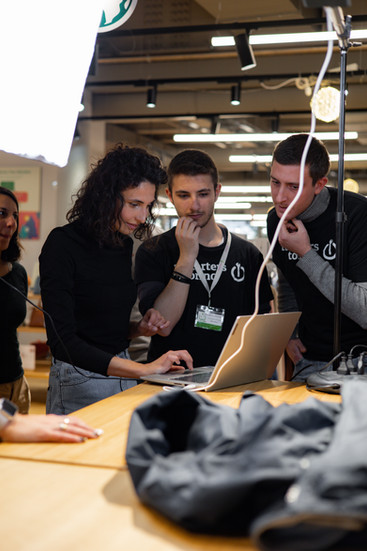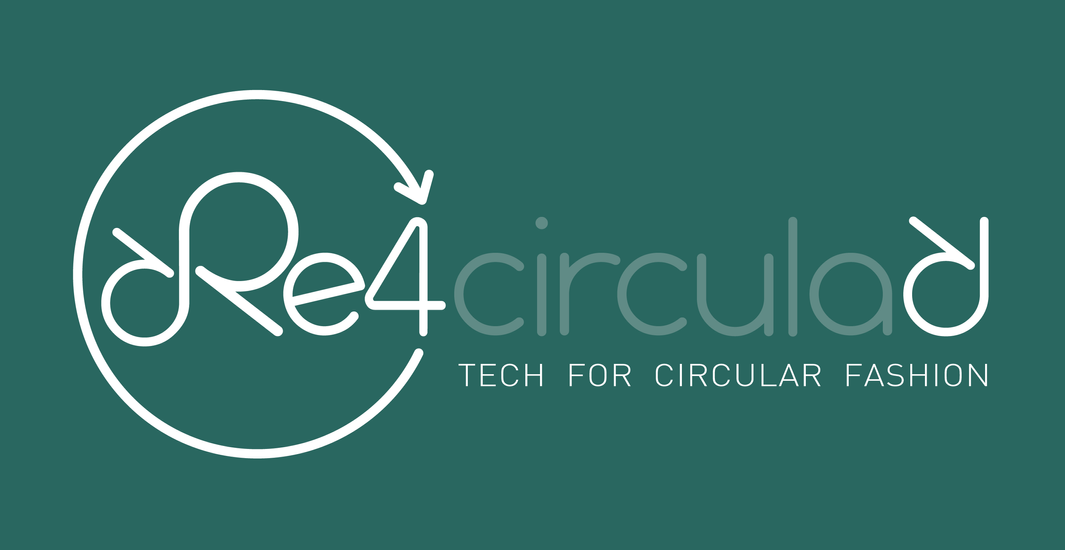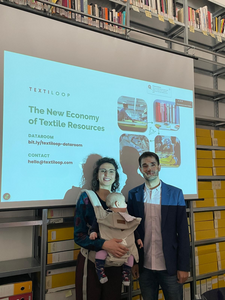Connecting Entrepreneurs across Europe: How Atelier Riforma & Textiloop redefine the fashion sector together
- Inco Com

- Apr 18, 2025
- 7 min read
Updated: May 23, 2025
Atelier Riforma in Italy and Textiloop in Croatia dream of a more sustainable fashion industry.
When the founders of the two startups realized they were working on opposite ends of the supply chain, they saw an opportunity for collaboration.
Atelier Riforma and Textiloop, alumni of Social Tides’ Grow AI and Grow accelerators, respectively, both work to reduce waste in the textile industry: the former uses AI to more efficiently sort post-consumer textiles to avoid landfills, while the latter manages waste in textile production.
The founders of the two startups met through Social Tides and instead of competing, they began to brainstorm how to work together to make the textile industry more sustainable and less wasteful – for everyone.
Recently, Elena Ferrero, co-founder and CEO of Aterlier Riforma, and Niko Bucalo, founder of Textiloop, sat down with Social Tides to discuss the two startups’ individual journeys, their budding collaboration, and the value of networks.
Social Tides: Can you introduce yourself and your startup? What problem are you solving and what impact does your work create?
Elena Ferrero: I am Elena Ferrero, co-founder and CEO of Atelier Riforma.
Atelier Riforma exists because it is currently very complex for organizations that collect post-consumer textiles to manage them locally, circularly and transparently. We’re here to change that.
Learning how millions of tons of textile waste are exported every year to developing countries, ending up in open-air landfills and negatively affecting the local communities made us realize that the current system doesn't work. Our AI solution and our digital platform are transforming the fashion sector by shaping a world where the sorting of used textiles and their directing to companies that can reuse, upcycle or recycle them is no longer a barrier for collection organizations. In this way, we would like every post-consumer textile not to end up landfilled or burned, but instead, be re-introduced into the circular economy and used as a resource by the fashion industry.
Niko Bucalo: My name is Niko Bucalo, and I am the founder of Textiloop.
Textiloop was created to tackle the inefficiencies in managing surplus raw materials within the textile industry.
The industry lacked an efficient way to track and redistribute surplus materials, leading to excessive waste. Excess materials and production waste today often go unused and just end up in developing countries' landfills causing significant environmental harm due to a lack of systematic approach being applied in the sector. Waste generators themselves are the ones paying the costs here. We identified this gap and developed a digital marketplace that provides these materials to find new value, and new life instead of becoming both a financial burden for the companies and an environmental burden for the ecosystem.
The Textiloop platform enables businesses to manage, trade, and reintegrate surplus textiles back into the loop, contributing to a more circular and sustainable fashion industry. We help companies reduce waste, optimize operational costs, and comply with the ever-evolving sustainability regulations. We also help end consumers get direct access to industry spill material, at a lower cost.
What have been your biggest challenges so far as an entrepreneur? How did you overcome them?
Elena: Early on, we struggled with attracting investors, but we tackled this issue by training ourselves in the startup world and acquiring the tools to develop our technology and grow our business. Now, we’ve grown beyond that phase and learned that the growth of a social enterprise (like ours) does not necessarily have to be based on investment rounds, but there are many other means to support our impact projects, such as calls for proposals or acceleration paths.
Niko: One of our main challenges was encouraging industry players to shift from a linear "take-make-dispose" model to a circular paradigm. Overcoming this requires extensive education, strong partnerships, and the willingness of all the stakeholders to adopt the model, so it remains an ongoing challenge. Additionally, securing funding in the early stages was difficult, but we leveraged impact-focused grants, accelerator programs, and strategic pilot collaborations to sustain growth.
The cross-European collaboration
How did you first meet, and what sparked the idea to collaborate? Was there a particular moment or challenge that made you realize you could work together?
Elena: We first connected through Social Tides and realized that we shared a mission of reducing waste in the fashion industry.
Instead of thinking about competition, we thought that both of our startups could benefit from a synergy.
Niko: We connected through Social Tides and quickly realized that our solutions were complementary. We were also participating in two additional funding programs simultaneously. Aware of how closely fashion-tech startups need to work together, we recognized the potential to collaborate. Fast-forward six months, and we're now in the reiteration feedback loop of creating a more comprehensive end-to-end circular solution for textile waste, covering both pre-production and post-consumer phases.
After your first connection, you have been working together in Turin. How did this in-person collaboration come about, and what has it enabled you to do? What shared challenge are you tackling, and how do your startups complement each other in solving it?
Elena: We applied for the Erasmus for Young Entrepreneurs program, which gave us the unique opportunity to work in person together in Turin, allowing us to explore synergies and test new ideas together. Since textile waste is created both in the production phase and in the post-consumer phase, we would like to combine Atelier Riforma's Re4Circular technology and Textiloop's technology to offer an end-to-end service, which reduces waste upstream and downstream of the fashion value chain.
Niko: Our shared goal is to close the loop in textile waste management by addressing both pre-consumer and post-consumer waste. Atelier Riforma focuses more on optimizing the post-consumer textiles flow, while Textiloop provides a funnel for more material efficiency at the production level. Together, we aim to create a net zero ecosystem that prevents valuable resources from becoming waste. The EYE program has allowed us to work together live, side by side - here in Turin, Italy. It made it possible to exchange knowledge in a real-time surrounding and align our fieldwork strategies, here in Italy's north, we're the sustainability scene is flourishing.
Being able to collaborate in person and in this hands-on manner has accelerated the development of our joint initiative, and allowed us to start exploring the real industry readiness for next-gen AI applications in optimized raw material resource handling.
How do you envision this collaboration evolving in the future? Are there any upcoming projects, launches, or expansions we should know about?
Elena: Our long-term vision is to scale our service also outside Italy and Croatia, targeting the EU market. The problem of waste in the fashion industry is a global and complex challenge, which therefore requires a holistic solution.
Niko: Scaling is definitely the way to go here, it would be amazing to see our solution not only connecting Italy and Croatia but also expanding across Europe's west. The textile waste problem spans wherever there are consumers. The long-term goal is holistic. About any thresholds/milestones achieved within the project's duration, we'll inform you via our blog posts.
The Role of Social Tides - INCO Entrepreneurs
How did Social Tides play a role in connecting and supporting your journey? Did funding, mentorship, networking, or training contribute to this partnership?
Elena: Through Social Tides, we gained access to funding, training, mentoring, and discussion with a community of social entrepreneurs like us. This made it possible to grow our team, gain more credibility and visibility as a startup, and outline a better strategy for getting our solution off the ground.
Niko: Social Tides has been instrumental in our journey, providing access to funding, mentorship, and a network of like-minded entrepreneurs, I believe that's what's most important. It helped us refine our strategy, scale our impact, and foster valuable collaborations, including our most recent partnership with Atelier Riforma.
What value have you gained from being part of the Social Tides/INCO Entrepreneurs community? Any particular moments that stood out?
Elena: Personally, the thing I appreciated the most was the discussion with other female entrepreneurs, with more experience than me, who gave me a lot of courage and inspiration to continue on my path as an entrepreneur (maintaining a good balance between work and family life, which is not so easy for passionate startuppers).
Niko: One of the most valuable aspects has been connecting with other social entrepreneurs who share a common vision for sustainable innovation. Exchanging experiences and sharing the network of contacts has not only provided insights but also reinforced our belief in the power of collaboration to drive systemic change.
How can people follow your work?
Where can people follow your updates? Website, LinkedIn, Instagram, or any other platforms?
Elena: Stay updated on our latest innovations and impact via our LinkedIn, Instagram, Facebook and YouTube pages and our website.
Niko: Actually, the best way for people to follow our work is in fact by following our footsteps and coming our way to join us in this venture - we're always looking for new partners, new stakeholders, and new people with skills to join the mission! But of course, for somebody just to stay in touch with all the new info popping up - stay updated by following us on LinkedIn, and our website.
Any final message or advice for fellow impact-driven entrepreneurs?
Elena: If you have a mission-driven idea, don’t be afraid to tell everyone about your idea, but rather tell it to as many people as possible and try to collaborate and create synergy with as many people, companies and organizations as possible.
The network that you create has an immeasurable value!
Niko: Collaboration is key! The challenges we face as impact-driven entrepreneurs are complex, but we can create real change by working together, sharing knowledge, and fostering partnerships.
Never hesitate to reach out, connect, and explore overlapping synergies with others in your field.
![[AI] Social-Tides_Logo 2025.png](https://static.wixstatic.com/media/e37d76_e3ce6c0a66164d80abc3c1352f346fff~mv2.png/v1/fill/w_176,h_55,al_c,q_85,usm_0.66_1.00_0.01,enc_avif,quality_auto/%5BAI%5D%20Social-Tides_Logo%202025.png)








































Comments